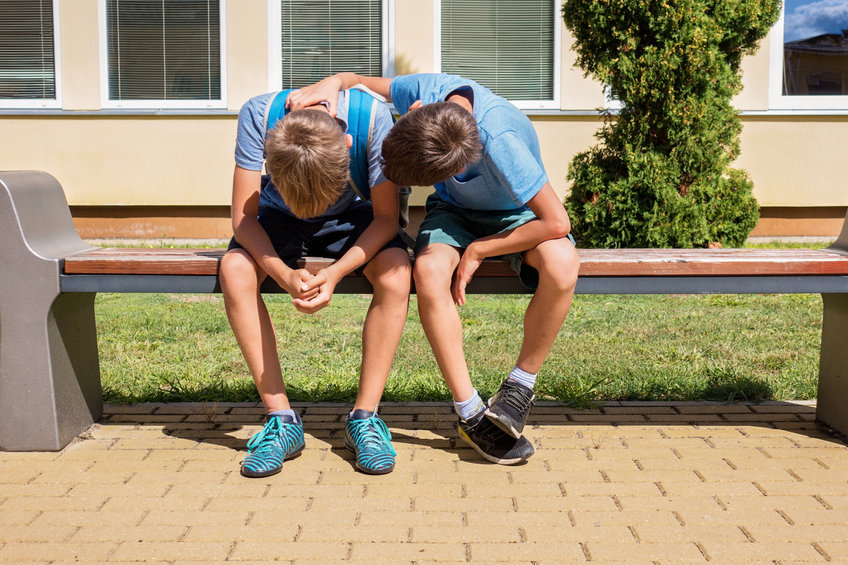5 Ways to Support Your Child’s Emotional Health for Back To School
Posted August 6, 2021 by Guest Poster -

With the new school year rapidly approaching, many parents are rushing to buy school supplies, new clothes, shoes, and books to help prepare and support our children for a great start to the school year.
But with the chaos of 2020-21 school closures, schedule changes, and a new reality in the midst of a pandemic, it is just as important to support our children’s emotional health this upcoming fall.
It is no secret that teen depression is steadily increasing.
Every 100 minutes a teen takes their own life in the USA, and twenty percent (20%) of all teens experience depression before they reach adulthood while only 30 percent of depressed teens are being treated for it.

Students not only feel the stress of their school work, tests, and extracurriculars, but they are simultaneously navigating a new landscape in a social media-saturated and pandemic world. That’s a lot for any of us, let alone a growing child who is trying to find their way.
This fall, it is imperative that we support our children’s emotional health as we transition into a new school year.
Here is a list of 5 ways to support our children’s mental health for school that used advice from a team of masters-level clinicians, therapists, and staff from Charlie Health.
1. Maintain Healthy Routines
Schedule changes can be rough. We all know it. However, prioritizing sleep, healthy and consistent meals, and daily activities can help you and your child find consistency in the chaos of the new school year. Our bodies and our minds are not separate entities- they interact, intertwine, and affect each other deeply. Helping our children take deliberate care of their bodies by sleeping enough, eating well, and getting to move sets our bodies up to be a good foundation for our minds to operate within. Make healthy routines a priority.

2. Practice Gratitude
Picture this- the entire family sits down for dinner. “How was your day at school, Jane?” the well-intentioned mother asks. Cue the LOUDEST eye roll of all time from Jane. As parents, we genuinely care about our child’s day, but sometimes that question can feel too overwhelming or simply “annoying” to our kids. Try practicing an intentional gratitude exercise instead of asking a vague question over dinner. Instead, ask, “What was the best thing that happened at school today? What was your favorite part of lunch? What are you grateful for today?” Go around the table, and everyone can answer in as little or as much detail.
This simple practice of gratitude (thankfulness, appreciation, or whatever you want to call it) has been clinically tested over the recent years. It has shown connections to increased feelings of happiness and overall well-being. The more we practice gratitude, the more we can train our brains to recognize the positives, even during the most challenging days. Let’s help our kids make a habit of gratitude.
3. Listen
Learning to listen is one of the best tools we have to support our children. Pulling from renowned psychotherapist Carl Rogers’ “person-centered approach,” we can learn a lot about really listening to and hearing our children. After all, as hard as it is for us to believe sometimes, they are their own best expert. Let’s give that expert a voice.
Here’s an example. Your child might come to you and say after the first week of school, “I don’t want to go to school, it’s hard, there’s too much homework and I hate it. All of it.” What we as parents want to say is, “School is important, and you got it! We raised a smart kid and we know you’ll figure it out!” While that may be absolutely true, all your child hears is “We don’t really care or understand how you feel.”
Instead, try responding with something like “I hear you. School is tough, and it sounds like you might be overwhelmed. Are there particular classes that stress you out?” Give your child space to respond and continue the conversation by listening, reflecting back and validating their responses, and asking questions to help you both better understand their problem. This is easier said than done, but it’s also easier with practice.
4. Look for Warning Signs
Another way to support our children’s emotional health for back to school is to be aware of the warning signs that might indicate a change in their mental health. Look for changes such as:
- Low self esteem
- Less active
- Increased substance use
- Isolating or spending more time alone
- Decrease in desire or passion of activities, sports, or hobbies they used to love
- Physical issues like sleeping problems, appetite changes, headaches
- Problems with behavior or failing at school
- Talking about death or suicide

While these changes in your child’s behavior may be startling, rest assured that resources are available to help. Recognizing these signs early and talking to your child honestly about how they are feeling is an important step in getting help.
5. Ask for Help
As parents, a.k.a. superheroes, our initial instinct is to HELP HELP HELP. But we do not always have the answers, resources, or tools to provide the best care, and that’s okay. The best thing we can do is reach out for help. If our child appears to be struggling during the new school year, we can:
- Contact school counselors or school psychologists- their job is to help, and they can help connect you and your child to local resources
- Talk to your child’s primary care physician for their opinion
- Central Wyoming Counseling Center (307)237-9583
- Wyoming Behavioral Institute Crisis Hotline: 1-800-457-9312
- Wyoming Suicide Health Line 988
- National Suicide Prevention Lifeline at 1 (800) 273-8255
Connecting to a local mental health professional can help you support your child in navigating the continuum of mental health care. There are many programs and levels of care your child might need, anywhere from hospitalization or residential treatment, intensive outpatient, or one time per week therapy.

As parents, we CAN learn and adapt along with our children to help support their mental health in the dawn of a new school year and changing social landscapes.
This post was written by a Charlie Health employee and mental health professional as part of a partnership with PrairieWifeInHeels.com that lasted from August 2021 – May 2022
Categories: Life As It Happens, Parenting
Tags: , back to school, charlie health, deprssion, Fall, mental health, mental health for children, parenting, school, suicide, support, teen depression, therapy for children





